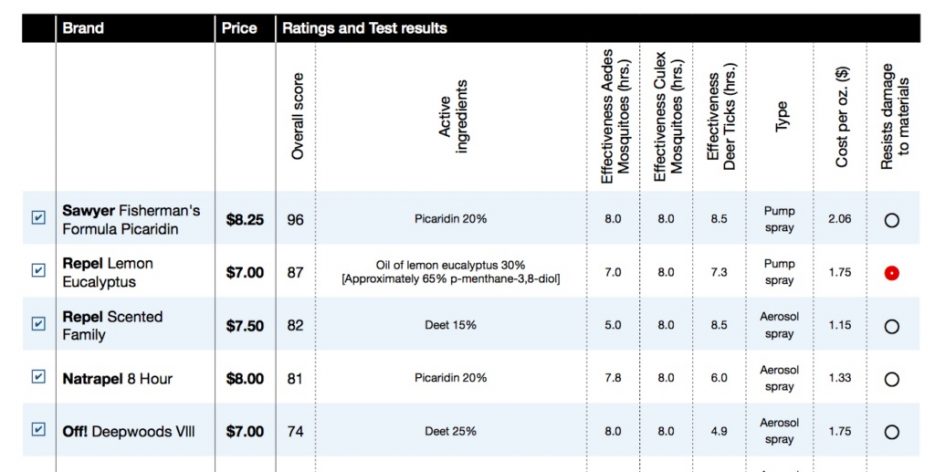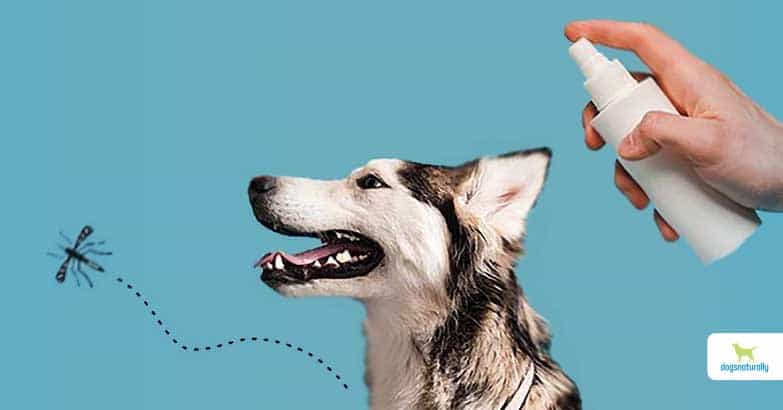When warmer weather approaches … it’s time for most dog owners to start worrying about heartworm. Did you know natural mosquito repellents for dogs could help keep heartworm at bay?
Heartworm spreads through infected mosquitoes …so mosquito bite prevention should be a top priority. But many repellents, along with heartworm medicines, aren’t good for your dog.
That’s where natural repellents can help. And luckily there are plenty of safe and effective natural solutions you can choose. Before we roll them out, let’s talk about why you should choose topical mosquito sprays for your dog.
Reasons To Use Topical Mosquito Sprays
Heartworm Preventives Aren’t Healthy For Your Dog
Heartworm medications are pesticides. They kill mosquito larvae by paralyzing or killing them – so they are neurotoxic.
But if they’re toxic to bugs .. they’re toxic to your dog. They can affect your dogs brain and nervous system. This is a special consideration in young animals with developing nervous systems … as well as the children who pet them.
Those pills turn your dog’s blood into a neurotoxic soup and it’s crazy to think this won’t hurt him.
Preventives Work Less And Less Every Year
Mosquitoes are becoming resistant to heartworm medications. Not to mention … a lot of dogs on preventives will still get heartworm.
Luckily, there are natural sprays and solutions that will help protect against mosquitoes … and they’re much healthier for your dog.
Bug Bites Can Cause Irritation Or Pain In Your Dog
Your dog wants to be outside but … if he isn’t protected he won’t enjoy his summer.
Preventives kill mosquito larvae but that doesn’t stop them from biting. And as you know … mosquito bites are an irritation, to say the least. Whether you use heartworm preventives or not … some extra topical protection is a good idea.
Now that you know why you should consider topical repellents, let’s review what products are available … and whether they can harm your dog.
Synthetic Mosquito Repellents
Let’s start with mosquito repellents that have synthetic insecticides. These are the most common repellents you’ll see on the store shelf.
DEET
DEET is also called N,N-Diethyl-3-methylbenzamide. It’s absorbed through the skin and passes into the blood. That means it’s not just hazardous to mosquitoes, but to your dog as well.
There’s a key nervous enzyme called acetylcholinesterase. This enzyme breaks down the molecules that trigger movement. If these molecules aren’t broken down, it can lead to uncontrollable movements. Scientists found that DEET can inhibit acetylcholinesterase in mammals and insects (1). The toxicity of DEET increases if it’s combined with other insecticides.
The upside of DEET is that products containing 30% DEET can protect for up to 5 to 6 hours. Or if they contain 10% DEET, up to 90 minutes. Canada has banned products with a DEET concentration over 30%.
Picaridin
Picaridin is another synthetic insecticide that carries fewer hazards than DEET. Consumer Reports showed products with 20% picaridin were more effective than DEET products.
Picaridin doesn’t carry the same neurotoxicity concerns as DEET. But there aren’t as many studies either … so the jury is still out on its long-term effects on health. Like DEET, picaridin is a synthetic compound … but it’s extracted from a plant that’s related to black pepper.
Consumer Reports rated a Picaridin formula at the top of their rankings … much higher than Deep Woods OFF! which was in 5th place.

PMD
Natural lemon oil is an effective mosquito repellent. It comes from the gum eucalyptus tree.
P-menthane-3,8-diol or PMD is the synthetic cousin of natural lemon eucalyptus oil. It’s what you’ll often find in store bought repellents. Consumer Reports found that products containing 30% lemon eucalyptus oil were more effective than those containing DEET … but the protection time isn’t quite as long.
And when it comes to Centers for Disease Control and Prevention (CDC) recommendations … lemon eucalyptus oil is the only natural oil recommended for mosquito bites. The US Department of Agriculture did a study. They compared 4 synthetic mosquito repellents and 8 natural mosquito repellents. They found that Repel Lemon Eucalyptus was the most effective repellent – more so than a 7% DEET repellent.
Repel also placed second (after Picaridin) in the Consumer Reports ranking. Repel is available at many different stores. It smells very strong so try a little dab on your dog to start and see how he reacts before you decide to use it.
10 Natural Mosquito Repellents For Dogs
Some sources don’t recommend natural insect repellents. That’s because they don’t last as long as the toxic preventatives. But if you apply it every 2 hours or so … your dog should stay protected. And you’ll both enjoy how safe and easy they are to use.
Try some of these natural options and see what works best for your dog.
1. Homemade Bug Spray
If you like making your own products, here’s a homemade natural bug spray recipe you can try …
- 1 glass spray bottle
- 15 drops lemon eucalyptus essential oil
- 2 oz witch hazel or another carrier oil like MCT or almond oil (use oil if your dog will be going in the water)
You can also experiment with 1 or more of these additional ingredients …
- 1 tsp real vanilla extract
- OR 6 drops peppermint essential oil
- OR 3 drops lavender essential oil or atlas cedarwood essential oil
Directions
- Mix the ingredients together in your glass spray bottle.
- Shake well before applying.
- Spray your dog all over, taking care not to spray his eyes.
2. Essential Oils
There are several plants whose essential oils have insect repellent properties. Popular ones include …
- Verbena
- Lavender
- Pine
- Catnip
- Rosemary
- Basil
- Lemon balm
- Lemon eucalyptus oil
- Peppermint
But remember …
Essential oils are very powerful for dogs. Be sure to always dilute essential oils with a carrier oil (like grapeseed oil) before using them on your dog. And remember to opt for organic, non gmo essential oils if possible.
Mix one drop of essential oil with 1 ml carrier oil and spray your dog with the mixture. You can use more than one type of oil … but remember to increase the carrier oil for each drop of essential oil you use.
RELATED: Here’s what canine herbalist Rita Hogan has to say about the risks of undiluted essential oils.
Some people like to use bandanas infused with essential oils to protect their dogs. If you do this, be sure to use diluted oils and remove the bandana when your dog comes indoors.
Caution: do not use essential oils of wintergreen, pennyroyal or clove on your dog. If you’re using a premade product, you’ll want to check the label. These oils are dangerous for your dog. You should not use them on your dog for any reason.
DNM RECOMMENDS: Kin+Kind offers Flea + Tick Prevent! – an all natural flea and tick spray to protect your dog from fleas and ticks and help soothe itching and swelling from bites. Buy Kin+Kind now>
3. Cinnamon Oil
In 2004 the Journal of Agricultural and Food Chemistry published a study (2). Researchers found that cinnamon oil can kill mosquito larvae.
The researchers also believed that cinnamon oil could be a good mosquito repellent … though they hadn’t tested it against adult mosquitoes. But natural health practitioners have used cinnamon oil to repel mosquitoes for years.
Cinnamon oil is also an essential oil, so you must dilute it. Mix one drop of cinnamon oil with 1 ml carrier oil. Spray your dog with the mixture.
4. Thyme Oil
Carvacrol and alpha-terpinene are two compounds derived from the essential oil of thyme. One study found they had greater repellency than a commercial DEET repellent (3).
Researchers suggest that a spray with 2% alpha terpinene works as a natural repellent. However, don’t try to make a thyme oil-repellent at home … it’s too irritating and strong-smelling to use at effective concentrations above 25%.
5. Fennel Oil
Researchers at Seoul National University in Korea did a study (4) that found that a spray repellent containing 5% fennel oil was 84% effective after 90 minutes.
A repellent cream with 8% fennel oil was 70% effective after 90 minutes.
6. Neem Oil
Neem oil is another effective dog-safe repellent. It’s an extract from the tropical neem tree … and it has insecticidal compounds called azadirachtins.
You can also use neem on open sores and wounds so it’s a useful oil to have in your first aid kit too. Neem also has anti-bacterial, anti-fungal and anti-viral properties.
The National Research Council of Canada found that neem affects more than 200 species of insects, including … mosquitoes, biting flies, sand fleas, ticks.
You can put a drop of neem oil on various places on your dog … as often as every day in mosquito season …
- On top of his head
- Behind his ears
- On his shoulder blades
- Along his back and flanks
- At the base of his tail
7. Cedar Oil
Cedar oil is a great non toxic option to keep pests off your dog. It repels mosquitoes, as well as fleas and ticks. In fact, it’s said that the ancient Egyptians used cedar oil in embalming to keep the bugs away.
Most people like the smell of cedar oil (and dogs don’t seem to mind it either) … but mosquitoes and other insects don’t like it. And if mosquitoes come into contact with cedar oil, it can kill them, their eggs, and their larvae.
Cedar oil …
- Pulls the water out of them
- Neutralizes body fluids
- Interferes with their respiratory system
- Inhibits their pheromone receptors
There are various commercially available products that are safe and effective. Look for a formulation that’s 10% to 20% cedar oil and spray your dog before he goes outside.
8. Citronella
A well-known natural mosquito repellent. The lotions, sprays, and candles use oil from the citronella plant.
The University of Guelph did a study on citronella and its ability to repel mosquitoes (5). Researchers assessed the effectiveness of 3% citronella candles and 5% citronella incense.
They found that subjects near the citronella candles had 42.3% less bites. Those near the citronella incense had 24.2% fewer bites. Based on these results, citronella candles shouldn’t be a stand-alone repellent … but they may help in combination with topical repellents.
Caution: Don’t use citronella oil directly on your dog as it can be toxic.
9. Garlic
Feeding your dog garlic can also help make him less appealing to insects. Garlic is safe for dogs in moderation. Always use US grown organic fresh whole clove garlic.
You can give ¼ clove of garlic per 10 pounds (use regular sized garlic, not jumbo). If your dog weighs less than 10 pounds, cut a ¼ clove of garlic in half and give ⅛ clove.
For giant breeds, don’t give more than 2 cloves of garlic per day.
Peel and chop the garlic about 15 minutes before feeding, then add it to your dog’s food. Start feeding garlic one month before the start of mosquito season.
10. Celery Seed Extract
A Thai study compared 15 mosquito repellents. All the repellents contained a topical extract from celery, Apium graveolens. The repellents were active against a wide range of mosquito species … comparable to a 25% DEET formula. And it didn’t irritate the skin or cause a burning sensation.
You can buy celery seed extract at health stores and apply it to your dog.
BONUS! Homeopathic Remedies To Repel Mosquitoes
While the preventive effect of some natural remedies listed above doesn’t last very long … oral homeopathic remedies can provide protection from insect bites for several hours.
Specific homeopathic remedies can …
- Reduce swelling, redness and itching
- Speed healing from insect bites
You can also use these same remedies to prevent insect bites. And if your dog does get bitten, the effect of the bite will be much reduced. These remedies aren’t only good for mosquitos. They can help with almost any insect you can think of.
Homeopathic remedies are very safe, with no harmful side effects. Here are some remedies that can prevent and heal insect bites or stings.
Staphysagria – helps inflammation that results from insect bites. This includes redness and swelling as well as other forms of inflammation …
- Ulcers with green or yellow pus
- Hives
- Scabby sores with water oozing from underneath
- Skin is difficult to heal
Ledumpalustre – for puncture wounds from any insect or object … often ones that cause long lasting discoloration. It also helps with …
- Swelling
- Itching
- Inflammation
- Red spots
- Rash
- Poison ivy
And it has anti-tetanus properties and can help prevent tick borne disease.
Grindeliarobusta – for insect bites, particularly fleas causing itching and burning. It can also be effective for poison oak or ulcers with swollen, purplish skin.
Cedron – antidotes the effect of snake bites as well as insect stings. There can be trembling and numbness of the whole body. Useful in malarial affections of damp, warm, marshy areas.
Urtica urens – useful for …
- Itching, raised, red blotches
- Nettle rash
- Prickly heat
- Elevated hives with rheumatism
- Vesicles
- Intense burning and itching.
You can use these remedies to treat your dog if he gets bitten by mosquitoes. Pick the one that best fits his symptoms.
You can also use a combination of all the remedies to both prevent and treat mosquito bites.
Place a couple of pellets or a few granules of each remedy in a low potency like 6C into a clean amber glass dropper bottle. Add spring or filtered water (never use tap water). If you want your homeopathic solution to last more than 2 or 3 days … add about 20% brandy or vodka to the mixture to preserve the remedy and it will keep for years. Do not refrigerate.
Shake the bottle well and place a few drops into your dog’s mouth about half an hour before he goes outside. The effect should last about 3 to 5 hours.
By using natural repellents, you can keep your dog safe from heartworm disease, itchy bites AND toxic pesticides!
FAQ
What is a natural remedy for mosquitoes on dogs?
A natural remedy for repelling mosquitoes on dogs includes using lemon eucalyptus oil, which is recognized for its mosquito-repellent properties. It’s important to dilute essential oils properly and apply them in moderation, ensuring they are safe for pet use, as even high quality, organic essential oils can be toxic to dogs.
Does vinegar repel mosquitoes on dogs?
Vinegar, particularly apple cider vinegar, can be used in small amounts in your dog’s water or applied to your dog’s skin as a natural insect repellent. However, its effectiveness may vary, and it should be used cautiously to avoid skin irritation or adverse reactions.
What is best mosquito repellent for dogs?
The best mosquito repellent for dogs is often a vet-approved, pet-safe repellent. Products specifically formulated for dogs are the safest choice, as they consider the unique sensitivities of your pet’s skin and health. Essentials oils (when used properly) can be a good option for natural protection without harmful chemicals.
Does coconut oil repel mosquitoes on dogs?
Coconut oil has been touted for its skin-moisturizing benefits and limited insect-repellent properties, including against mosquitoes. Its lauric acid content may help repel certain pests, but it should not be solely relied upon for complete protection against mosquito bites. It’s best to combine it with organic essential oils and other strategies.
References
- Corbel, V., Stankiewicz, M., Pennetier, C. et al. Evidence for inhibition of cholinesterases in insect and mammalian nervous systems by the insect repellent deet. BMC Biol 7, 47 (2009).
- American Chemical Society. (2004, July 16). Cinnamon Oil Kills Mosquitoes. ScienceDaily.
- Choi WS, Park BS, Ku SK, Lee SE. Repellent activities of essential oils and monoterpenes against Culex pipiens pallens. J Am Mosq Control Assoc. 2002 Dec;18(4):348-51.
- Kim SI, Chang KS, Yang YC, Kim BS, Ahn YJ. Repellency of aerosol and cream products containing fennel oil to mosquitoes under laboratory and field conditions. Pest Manag Sci. 2004 Nov;60(11):1125-30.
- Lindsay LR, Surgeoner GA, Heal JD, Gallivan GJ. Evaluation of the efficacy of 3% citronella candles and 5% citronella incense for protection against field populations of Aedes mosquitoes. J Am Mosq Control Assoc. 1996 Jun;12(2 Pt 1):293-4.















